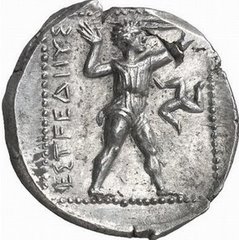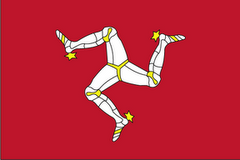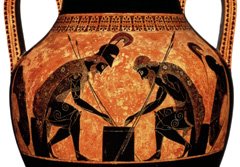LYSIAS
FUNERAL ORATION
FUNERAL ORATION

11-26. In a later time, when Heracles had vanished from amongst men, and his children were fleeing from Eurystheus and were expelled by all the Greeks, who were ashamed of these acts but afraid of Eurystheus' power, they came to this city, and seated themselves as suppliants at our altars. And when Eurystheus demanded them, the Athenians refused to give them up, but revered the virtue of Heracles more than they feared their own danger, and preferred to do battle for the weaker on the side of the right, rather than favour the powerful by giving up to them the men whom they had wronged. Eurystheus marched against them with the people who held the Peloponnese at that time; yet they did not falter at the approach of the danger, but maintained the same resolve as before, though they had received no particular benefit at the father's hands, and could not tell what manner of men the sons would grow to be. Acting on what they held to be just, on no grounds of former enmity against Eurystheus, with no gain in view but good repute, they made this perilous venture on behalf of those children, pitying the wronged and hating the oppressor; attempting to check the one, and deigning to assist the other; conceiving it a sign of freedom to do nothing against one's will, of justice to succour the wronged, and of courage to die, if need be, in fighting for those two things at once. So high was the spirit of both sides that Eurystheus and his forces sought no advantage from any offer of the Athenians, while the Athenians would not suffer Eurystheus, even at his own supplication, to take away their suppliants. Having arrayed their own sole force against the host assembled from the whole Peloponnese, they conquered them in battle, rescued the sons of Heracles from bodily peril, liberating also their souls by ridding them of fear, and by their own daring crowned the sons with the meed of their father's valour. So much happier in the event were these, the children, than the father; for he, though author of many benefits to all mankind, devoted his life to a laborious quest of victory and honour, did indeed chastise those who wronged others, but was unable to punish Eurystheus, who was both his enemy and his oppressor. Whereas his sons, thanks to this city, saw on the same day both their own deliverance and the punishment of their enemies.
Now in many ways it was natural to our ancestors, moved by a single resolve, to fight the battles of justice: for the very beginning of their life was just. They had not been collected, like most nations, from every quarter, and had not settled in a foreign land after driving out its people: they were born of the soil, and possessed in one and the same country their mother and their fatherland. They were the first and the only people in that time to drive out the ruling classes of their state and to establish a democracy, believing that liberty of all to be the strongest bond of agreement; by sharing with each other the hopes born of their perils they had freedom of soul in their civic life, and used law for honouring the good and punishing the evil. For they deemed that it was the way of wild beasts to be held subject to one another by force, but the duty of men to delimit justice by law, to convince by reason, and to serve these two in act by submitting to the sovereignty of law and the instruction of reason.
For indeed, being of noble stock and having minds as noble, the ancestors of those who lie here achieved many noble and admirable things; but ever memorable and mighty are the trophies that their descendants here everywhere left behind them owing to their valour. For they alone risked their all in defending the whole of Greece against many myriads of the barbarians. For the King of Asia, not content with the wealth that he had already, but hoping to enslave Europe as well, dispatched an army of five hundred thousands. These, supposing that, if they obtained the willing friendship of this city or overwhelmed its resistance, they would easily dominate the rest of the Greeks, landed at Marathon, thinking that we should be most destitute of allies if they made their venture at a moment when Greece was in distension as to the best means of repelling the invaders. Besides, from the former actions of our city they had conceived a particular opinion of her: they thought that if they attacked another city first, they would be at war with it and Athens as well, for she would be zealous in coming to succour her injured neighbours; but if they made their way here first, no Greeks elsewhere would dare attempt the deliverance of others, and for their sake incur the open hostility of the foreigners. These, then, were the motives of the foe. But our ancestors, without stopping to calculate the hazards of the war, but holding that a glorious death leaves behind it a deathless account of deeds well done, had no fear of the multitude of their adversaries, but rather had confidence in their own valour. And feeling ashamed that the barbarians were in their country, they did not wait till their allies should be informed and come to their support; rather than have to thank others for their salvation, they chose that the rest of the Greeks should have to thank them. With this one resolve in the minds of all, they marched to the encounter, though few against many: for death, in their opinion, was a thing for them to share with all men, but prowess with a few; and while they possessed their lives, because of mortality, as alien things, they would leave behind something of their own in the memory attached to their perils. And they deemed that a victory which they could not win alone would be as impossible with the aid of their allies. If vanquished, they would perish a little before the others; if victorious, they would liberate the others with themselves. They proved their worth as men, neither sparing their limbs nor cherishing their lives when valour called, and had more reverence for their city's laws than fear of their perils in face of the enemy; and so in their own land they set up on behalf of Greece a trophy of victory over the barbarians, who had invaded others' territory for money, past the frontiers of their land; and so swiftly did they surmount their ordeal that by the same messengers information reached the other Greeks both of the barbarians' arrival here and of our ancestors' triumph. For indeed none of the other Greeks knew fear for the peril to come; they only heard the news and rejoiced over their own liberation. No wonder, then, that these deeds performed long ago should be as though they were new, and that even to this day the valour of that band should be envied by all mankind.


